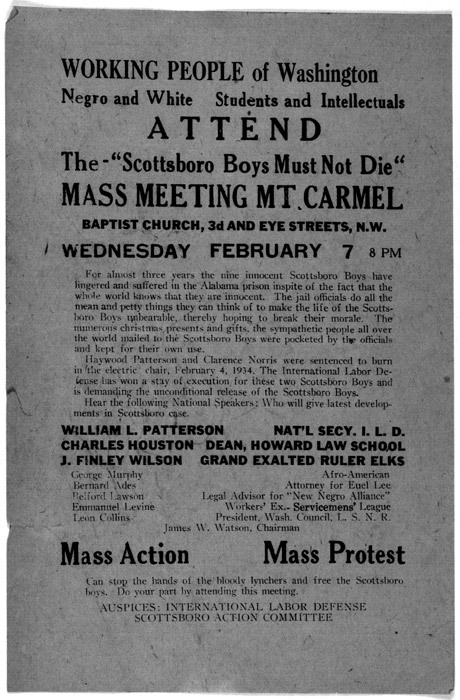SECTION 09
The Scottsboro Trial
Amidst the most desperate days of the Depression, a group of young black men had heard of government jobs being offered in Memphis and were on their way to investigate. They would never reach their destination. On 25 March 1931 nine young African Americans were arrested in Alabama on false charges of rape. The young men had hopped a ride on a freight train traveling between Chattanooga and Memphis, looking for a free ride on an unusually warm spring afternoon. After getting into a fight with a group of white youth, the black men were violently hauled of the train, arrested, and charged with the rape of two young white women said to be aboard the train. Despite the lack of evidence, within a few days all nine men had been indicted. Blacks were excluded from the hastily formed all-white jury, and the defense attorneys were given only twenty-five minutes to consult with their clients before the trial began. All nine African-Americans were found guilty and eight were sentenced to death in the electric chair. Leroy Wright, who was only twelve years old at the time, was spared the death sentence.
Flyer for organizing meeting to protest the Scottsboro boys' conviction (February 7, 1934).
Source: Rare Books and Special Collections Division, Library of Congress, Washington, DC.
Although there was overwhelming evidence that no interaction had ever occurred between the women and the black youth, including the testimony of one of the white girls involved, the trial continued. A vigorous international defense of the “Scottsboro Boys” was initiated by the Communist Party, despite the inability of the boys and their families to pay for lawyers. The case was given to a vibrant communist lawyer by the name of Samuel Leibowitz. In front of the Federal Supreme Court, Leibowitz argued that the case had been sealed by the fact that the boys had been tried by an all white jury, a clear violation of the constitutional right to trial by peers.
Even with the 1935 triumph of Norris v. Alabama , which declared the unconstitutionality of barring black people from juries, the Scottsboro case was brought back to local cases and overturned. By 1936, after two ILD lawyers had been caught trying to bribe one of the young women involved into changing her story, the CPUSA decided that with the public opinion in Alabama as it was towards Communists, it would be better for the case if they removed themselves. It was subsequently taken up by the NAACP, which led the Supreme Court to order a new trial when the defense lawyers were able to demonstrate that their clients were not provided with adequate counsel. The NAACP would enlist their Legal Defense Fund, the organization founded by Charles Hamilton Houston to take up segregation cases. Despite the evidence, the young men were once again convicted and subsequently given prison terms of 99 years. The case demonstrated the collusion of white government and judicial officials to uphold racial segregation at any cost through terror, coercion, and the meaningless abuse of human life. Though all the men would be released by 1950, their time in prison left them deeply scarred.
Related Resources
Flyer for organizing meeting to protest the Scottsboro boys' conviction (February 7, 1934).
A flyer announcing a "Scottsboro boys must not die" mass meeting, organized by the International Labor Defense Scottsboro Action Committee.
Source: Rare Books and Special Collections Division, Library of Congress, Washington, DC.


